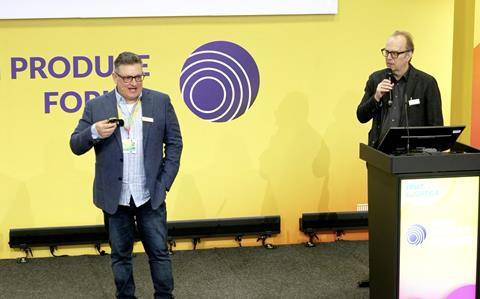New solutions for today’s challenges in the world of fresh produce were under the spotlight on the Fresh Produce Forum stage

Darryn Keiller, founder and CEO of WayBeyond, took a deep dive into current and future solutions for the agricultural business as a speaker on the Fresh Produce Forum stage at Fruit Logistica.
WayBeyond, which originated in New Zealand and is now headquartered in the US, offers digital agronomy solutions designed for protected cultivation.
“The topic of rethinking horticulture is really about what needs to change,” he said. “There are a lot of challenges in fresh produce production that have not gotten any better – in fact they have got materially worse. We need to talk about how these can be addressed.”
Challenges and trends
He said it was important to move the business forward by utilising the technology that had emerged in recent years, such as cloud technology, data, artificial intelligence, sensor technology and more, bringing them together to improve production and do it in a way that was more sustainable and beneficial for the planet.
Looking at some of the macro trends in fresh produce, Keiller highlighted challenges such as the pressure on consumption, the global increase in temperatures, the impact of sustainability legislation and a lack of labour.
”Labour is a major issue all around the world, and this is why technology is very important,” he told the gathered visitors.
“It’s not all about robotics,” Keiller noted. ”If you’re in a high-tech glasshouse in the Netherlands of Germany, then robotics is a good option for you. But if you’re a large-scale producer using plastic greenhouses in Morocco, where you’ve got 1,000 hectares of tomato production, it’s not going to work for you – it’s not scaleable or affordable – but there are other ways of helping optimise labour by using data and information.”
Solutions for producers
WayBeyond is helping growers face up to these many challenges by digitising information, and Keiller pointed out that it wasn’t simply about the data, but also the knowledge related to a particular practice within a company’s system.
“We collect billions of data points, but we also invest in knowledge into the system,” he explained. ”And that is how we are able to provide prescriptive direction to the growers about what actions they should be taking. It is only when you do that, that it becomes very powerful.”
Keiller put forward what he described as the pillars of modern crop management, consisting of the unification of a farms agronomy data; monitoring plant health and microclimates; proactively managing pests and diseases; and mastering crop steering and maximising yield.
He called on producers to embrace context-driven insights to maximise crop yields, incorporating climate analysis, plant balance – whether a plant is in a generative or vegetative state – and short-term yield forecasting.
“My key message is that things need to change, we can’t keep doing things the way we have for the last 30 years,” Keiller added. ”The challenge is on everybody to participate in that process.
”Education plays a big part, producers changing their strategy plays a part – it’s about people thinking about how we move forward as an industry.”



